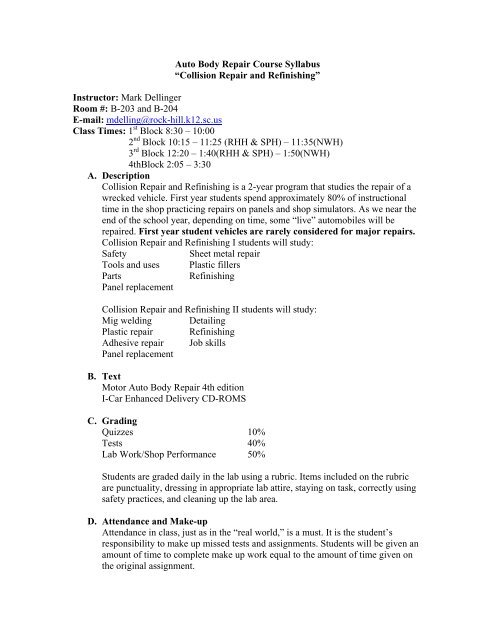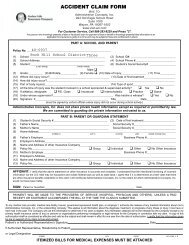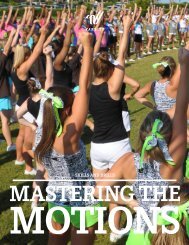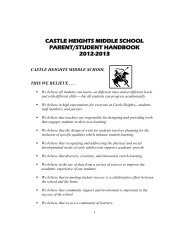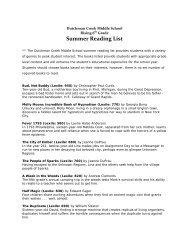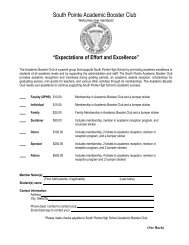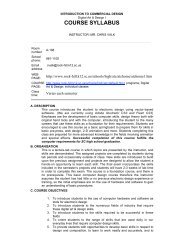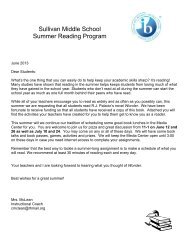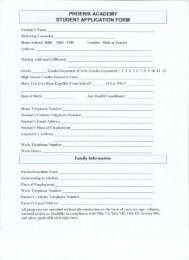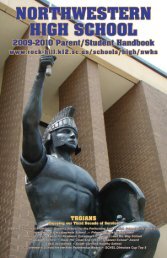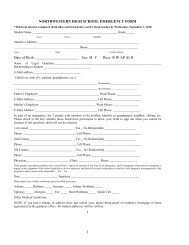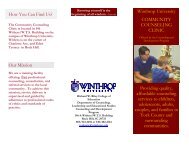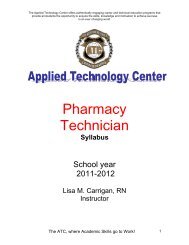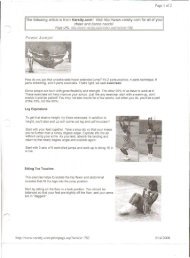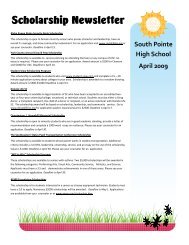Auto Body Repair Course Syllabus âCollision Repair and ...
Auto Body Repair Course Syllabus âCollision Repair and ...
Auto Body Repair Course Syllabus âCollision Repair and ...
Create successful ePaper yourself
Turn your PDF publications into a flip-book with our unique Google optimized e-Paper software.
<strong>Auto</strong> <strong>Body</strong> <strong>Repair</strong> <strong>Course</strong> <strong>Syllabus</strong><br />
“Collision <strong>Repair</strong> <strong>and</strong> Refinishing”<br />
Instructor: Mark Dellinger<br />
Room #: B-203 <strong>and</strong> B-204<br />
E-mail: mdelling@rock-hill.k12.sc.us<br />
Class Times: 1 st Block 8:30 – 10:00<br />
2 nd Block 10:15 – 11:25 (RHH & SPH) – 11:35(NWH)<br />
3 rd Block 12:20 – 1:40(RHH & SPH) – 1:50(NWH)<br />
4thBlock 2:05 – 3:30<br />
A. Description<br />
Collision <strong>Repair</strong> <strong>and</strong> Refinishing is a 2-year program that studies the repair of a<br />
wrecked vehicle. First year students spend approximately 80% of instructional<br />
time in the shop practicing repairs on panels <strong>and</strong> shop simulators. As we near the<br />
end of the school year, depending on time, some “live” automobiles will be<br />
repaired. First year student vehicles are rarely considered for major repairs.<br />
Collision <strong>Repair</strong> <strong>and</strong> Refinishing I students will study:<br />
Safety<br />
Sheet metal repair<br />
Tools <strong>and</strong> uses Plastic fillers<br />
Parts<br />
Refinishing<br />
Panel replacement<br />
Collision <strong>Repair</strong> <strong>and</strong> Refinishing II students will study:<br />
Mig welding Detailing<br />
Plastic repair Refinishing<br />
Adhesive repair Job skills<br />
Panel replacement<br />
B. Text<br />
Motor <strong>Auto</strong> <strong>Body</strong> <strong>Repair</strong> 4th edition<br />
I-Car Enhanced Delivery CD-ROMS<br />
C. Grading<br />
Quizzes 10%<br />
Tests 40%<br />
Lab Work/Shop Performance 50%<br />
Students are graded daily in the lab using a rubric. Items included on the rubric<br />
are punctuality, dressing in appropriate lab attire, staying on task, correctly using<br />
safety practices, <strong>and</strong> cleaning up the lab area.<br />
D. Attendance <strong>and</strong> Make-up<br />
Attendance in class, just as in the “real world,” is a must. It is the student’s<br />
responsibility to make up missed tests <strong>and</strong> assignments. Students will be given an<br />
amount of time to complete make up work equal to the amount of time given on<br />
the original assignment.
E. Expenses<br />
1. Students are required to wear appropriate attire in the shop area. Coveralls<br />
are acceptable, however, another option will be class t-shirts. Coveralls<br />
may be purchased from a local retailer. T-shirts for $5 each will be<br />
available through the instructor. Replacement t-shirts may be available<br />
throughout the year for $10.<br />
2. One pair of safety glasses will be provided for each student. Replacements<br />
will be available for $3.<br />
3. State law m<strong>and</strong>ates a respirator must be used when working with<br />
hazardous materials. Due to personal hygiene, it is requested that each<br />
student have their own. They can be purchased for $15 through the<br />
instructor. They are also available at local retailers ranging from $17 to<br />
$25.(NIOSH approved only)<br />
4. Students will be issued tools to use in the shop area. They are responsible<br />
for any tool issued to them. A replacement fee will be charged to any<br />
student who looses or damages a class tool.<br />
F. Expectations<br />
1. Exercise safety procedures at all times.<br />
2. Wear eye protection while in the shop.<br />
3. Do not distract anyone who is using power tools or equipment.<br />
4. Do not interrupt classroom instructional time.<br />
5. Follow all shop rules.<br />
6. Absolutely no horseplay in the shop area.<br />
7. Conform to all ATC/home school rules of conduct.<br />
8. Respirators must be worn when working with hazardous materials.<br />
As a student in the Collision <strong>Repair</strong> <strong>and</strong> Refinishing program at ATC, you can<br />
expect that your instructor will:<br />
1. Give you 100%<br />
2. Treat you as an adult.<br />
3. Try to underst<strong>and</strong> your point of view.<br />
4. Treat you, very much, like an employer will.<br />
5. Defend you when you are right.<br />
6. Provide current, useful information<br />
7. Never ask you to do something that he/she would not do.<br />
8. Lead by example.<br />
9. Help you become employable if you demonstrate that you want to be.<br />
10. Never be satisfied with second best.<br />
Tentative Class Schedule<br />
Orientation/General Shop Safety<br />
Metal Straightening<br />
Plastic Filler<br />
Refinishing<br />
2 weeks<br />
3 weeks<br />
4 weeks<br />
9 weeks
80:20 %s 90:10<br />
I. Orientation/Safety 2 weeks II Orientation/Safety 1 week<br />
Tools 1 week <strong>Repair</strong> Orders 1 week<br />
Parts 1 week Adhesive <strong>Repair</strong> 1 week<br />
Designs 1 week Structural <strong>Repair</strong> 4 week<br />
Clips 1 week Damage Analysis 4 week<br />
Filler 1 week Panel Replacement 4 week<br />
S<strong>and</strong>paper 1 week Detailing 2 week<br />
Straightening 1 week Job skills 1 week<br />
Refinishing 1 week<br />
I have read <strong>and</strong> underst<strong>and</strong> the rules <strong>and</strong> expectations for Collision <strong>Repair</strong> <strong>and</strong><br />
Refinishing<br />
Parent Signature<br />
Student Signature


